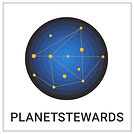
Call For Abstracts
Rethinking planetary and sustainability governance through cosmological imaginaries
October 16 - 17, 2025
Copernicus Institute of Sustainable Development, Faculty of Geosciences, Utrecht University

Xiao-Shan Yap, Florian Rabitz, Vladimir Brljak, Stamatina Mastorakou, Adrien De Sutter
CALL FOR ABSTRACTS
Workshop co-hosted by EU COST Action FOGOS, ERC PlanetStewards Project, Earth-Space Sustainability Network, and Space in Time
Sustainability challenges of the twenty-first century have—for the first time in human history— transcended the physical bounds of Earth, and their governance requires a renewed (extra-)planetary paradigm, connecting the terrestrial and the celestial. Amid accelerating satellite deployments, lunar missions, and ambitions for Mars and beyond, Earth and outer space have become increasingly intertwined: environmentally, politically, culturally, and intellectually. The emerging Earth-Space systems paradigm shapes not only the scientific, but also political, cultural, and intellectual debate on human space activities. At the same time, Earth-Space systems are socially constructed and historically contingent, raising the questions of how they become what they are and how they might develop in the future.
This workshop brings together researchers across the human, natural, and social sciences to explore how our understanding of Earth-Space systems can be informed by both premodern and modern cosmological imaginaries. For millennia, cultures around the planet have looked to the heavens not only to understand what lies beyond it, but to construct and inform key aspects of their terrestrial existence and experience. How do these premodern imaginaries relate to those emerging from contemporary space science, astronomy, cosmology, and related sciences, along with associated anthropological, philosophical, and sociological perspectives? How do modern and premodern cosmological imaginaries alike inform current perspectives on Earth-Space sustainability and (extra-) planetary governance?
Engaging with diverse cosmological traditions across time, place, and disciplines, the workshop will construct the contours of an Earth-Space systems paradigm; explore shifting notions of the planetary from Earth-bound, anthropocentric views toward a renewed understanding of Earth’s place grounded in planetary-cosmic constructs; and discuss implications for Earth-Space sustainability governance. We especially welcome contributors working across, but not limited to, the following disciplines or research areas:
1. SPACE SCIENCE,
e.g., astrobiology, astronomy, astrophysics, cosmology, and planetary sciences including the study of the Moon, Mars, and asteroids;
2. CRITICAL ENGAGEMENTS WITH SPACE AND SPACE SCIENCE,
insofar as they relate to questions of Earth-Space sustainability and (extra-)planetary imaginaries from the perspective of sociology, anthropology, philosophy, governance, or science and technology studies; and
3. SPACE HISTORY,
covering all periods from prehistory to the present; encompassing relevant work in the histories of art, astrology, astral knowledge, astronomy, cosmology, literature, religion, science, and philosophy; drawing on visual and material as well as textual sources; and with a particular interest in work exploring longue durée perspectives, especially across the premodern/modern boundary
Join Us to Explore and Co-shape the New Paradigm
Workshop participants will critically explore and jointly contribute to the shaping of the Earth-Space systems paradigm. Selection of presentations will focus on those that can contribute to one (or more) of the following cross-cutting themes:
-
What roles do space science (e.g., modern astronomy, astrophysics, and physical cosmology) play in enabling or constraining the constructs of Earth-Space systems and (extra-)planetary imaginaries?
-
In what ways do pre- and early-modern astronomical and cosmological models and imaginaries inform contemporary understandings of Earth-Space systems?
-
What does it mean to engage in celestial stewardship—whether of asteroids, the Moon, or other planetary systems such as Mars, in view of the increasing human activities on other celestial bodies? How might the different perspectives impact considerations for Earth-Space sustainability and what are the implications for (extra-)planetary governance?
This target workshop is a follow-up from the first Earth-Space Symposium in November 2024, Utrecht, and part of the research programmes of the ERC PlanetStewards Project and the EU COST Action FOGOS, within the larger Earth-Space Sustainability Network and in collaboration with the Space in Time network.
The workshop is restricted to 35 participants, with 20 fully-funded spots available. We invite abstracts for in-person presentations of no more than 300 words to be submitted to Dr. Xiao-Shan Yap at x.s.yap@uu.nl by September 7, 2025. Selected speakers or participants will be reimbursed for their travel expenses (up to 700 euros for trains or flights, and up to 200 euros per day for daily allowances to cover meals and accommodations).
For more information, please contact: Dr. Xiao-Shan Yap at x.s.yap@uu.nl.
Co-Hosted by





Space In Time
CALL FOR ABSTRACTS
Rethinking planetary and sustainability governance through cosmological imaginaries
Key Information
-
Participation: Limited to 35 participants
-
Funding:
-
20 fully-funded spots available
-
Travel reimbursement up to €700 (train/flight)
-
Daily allowance up to €200/day (meals + accommodation)
-
-
Format: In-person presentations
Submission Details
-
Abstract length: max 300 words
-
Deadline: September 7, 2025 (Closed)
